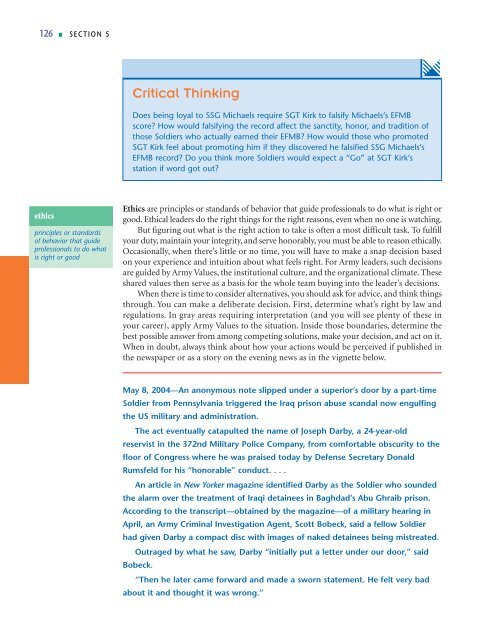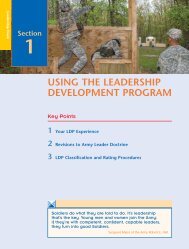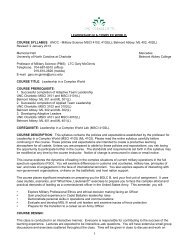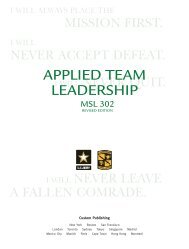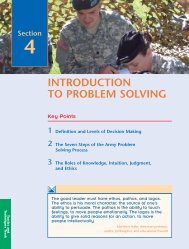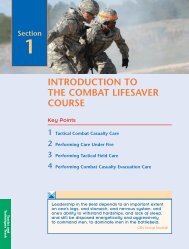Army Leader Ethics.pdf - UNC Charlotte Army ROTC
Army Leader Ethics.pdf - UNC Charlotte Army ROTC
Army Leader Ethics.pdf - UNC Charlotte Army ROTC
- No tags were found...
Create successful ePaper yourself
Turn your PDF publications into a flip-book with our unique Google optimized e-Paper software.
126 ■ SECTION 5Critical ThinkingeDoes being loyal to SSG Michaels require SGT Kirk to falsify Michaels’s EFMBscore? How would falsifying the record affect the sanctity, honor, and tradition ofthose Soldiers who actually earned their EFMB? How would those who promotedSGT Kirk feel about promoting him if they discovered he falsified SSG Michaels’sEFMB record? Do you think more Soldiers would expect a “Go” at SGT Kirk’sstation if word got out?ethicsprinciples or standardsof behavior that guideprofessionals to do whatis right or good<strong>Ethics</strong> are principles or standards of behavior that guide professionals to do what is right orgood. Ethical leaders do the right things for the right reasons, even when no one is watching.But figuring out what is the right action to take is often a most difficult task. To fulfillyour duty, maintain your integrity, and serve honorably, you must be able to reason ethically.Occasionally, when there’s little or no time, you will have to make a snap decision basedon your experience and intuition about what feels right. For <strong>Army</strong> leaders, such decisionsare guided by <strong>Army</strong> Values, the institutional culture, and the organizational climate. Theseshared values then serve as a basis for the whole team buying into the leader’s decisions.When there is time to consider alternatives, you should ask for advice, and think thingsthrough. You can make a deliberate decision. First, determine what’s right by law andregulations. In gray areas requiring interpretation (and you will see plenty of these inyour career), apply <strong>Army</strong> Values to the situation. Inside those boundaries, determine thebest possible answer from among competing solutions, make your decision, and act on it.When in doubt, always think about how your actions would be perceived if published inthe newspaper or as a story on the evening news as in the vignette below.May 8, 2004—An anonymous note slipped under a superior’s door by a part-timeSoldier from Pennsylvania triggered the Iraq prison abuse scandal now engulfingthe US military and administration.The act eventually catapulted the name of Joseph Darby, a 24-year-oldreservist in the 372nd Military Police Company, from comfortable obscurity to thefloor of Congress where he was praised today by Defense Secretary DonaldRumsfeld for his “honorable” conduct. . . .An article in New Yorker magazine identified Darby as the Soldier who soundedthe alarm over the treatment of Iraqi detainees in Baghdad’s Abu Ghraib prison.According to the transcript—obtained by the magazine—of a military hearing inApril, an <strong>Army</strong> Criminal Investigation Agent, Scott Bobeck, said a fellow Soldierhad given Darby a compact disc with images of naked detainees being mistreated.Outraged by what he saw, Darby “initially put a letter under our door,” saidBobeck.“Then he later came forward and made a sworn statement. He felt very badabout it and thought it was wrong.”


